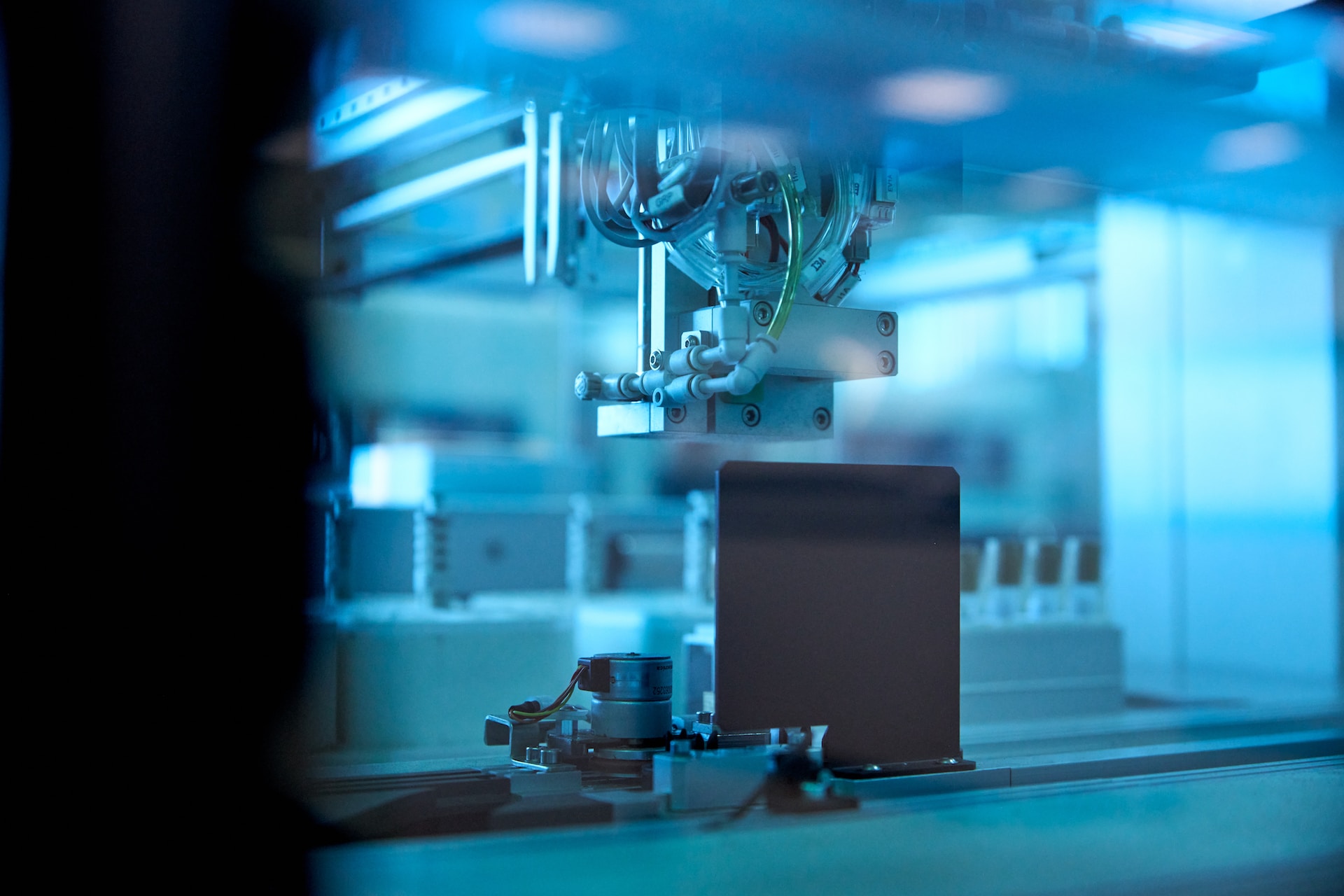How Technological Advancements Impact Hiring for Medtech Jobs
17 Jun, 202411 minsThe Medtech industry is constantly evolving, where technological advancements play a pivotal...

The Medtech industry is constantly evolving, where technological advancements play a pivotal role in shaping not only the products and services offered but also hiring and recruitment. From innovative medical devices to cutting-edge software solutions, technological progress drives opportunities and challenges for professionals seeking careers in medtech. Understanding the profound impact of these advancements on hiring practices is essential for both employers and medtech job seekers when navigating the industry.
In this guide, we will explore the key technological advancements in medtech jobs, delving into the impact these innovative developments have on hiring for medtech careers. We will discuss how hiring managers and employers can manage these effects as we take a closer look at the advantages of transferable skills.
First, let’s explore the key technological advancements that are currently shaping medtech recruitment:
Key Technological Advancements Impacting Medtech Jobs
Here are some of the key technological advancements impacting the medtech industry:
AI and machine learning - Technological advancements in AI and machine learning are revolutionising the medtech sector, leading to advanced diagnostics in areas such as medical imaging analysis. AI is also used to develop personalised medicine and automate routine activities to save healthcare professionals valuable time.
Robotics and surgical assistance - Advancements in robotics and surgical assistance have enabled healthcare professionals to perform minimally invasive surgery with higher accuracy, leading to faster patient recovery times and reduced health complications. Robotic technology also allows surgeons to perform telepresence surgery, where procedures are conducted remotely.
Biotechnology and personalised medicine - Progression in biotechnology and personalised medicine leads to more accurate and targeted approaches to healthcare and diagnostics. Biotechnology includes creating materials for functional tissues and organs for transplantation, gene therapy used to identify disease risks, and tailoring drug therapies to attack specific disease cells.
Telemedicine - By leveraging digital communication technologies, telehealth allows patients to access medical services remotely, overcoming time and distance limitations. This innovation not only improves patient convenience but also enhances healthcare efficiency by enabling timely consultations, reducing unnecessary hospital visits, and facilitating remote monitoring.
Data Analytics - Medtech tools, such as wearables and electronic health records, collect vast amounts of data, which allows data analytics to uncover patterns in patient records and predict outcomes. This allows doctors to form accurate diagnoses, creating more effective treatment plans using data to implement personalised medicine tailored to each patient's unique needs.
So, now that we have pinpointed the key technological advancements within medtech let’s delve into how they are currently impacting hiring for medtech jobs:
Evolving Roles in Medtech Jobs
According to recent research, the medtech market is expected to surpass US$ 776,467.7 million by 2033 and grow at a CAGR of 4.4% from 2023 to 2033. As the market grows, technological advancements are expanding, and medtech is being reshaped. As new developments emerge, there's a surge in demand for skilled professionals to develop and implement these innovations.
It is no surprise that the demand for specialised expertise means the job market in medtech is evolving rapidly. With companies embracing new technology, new job opportunities are emerging, prompting employers to seek candidates willing to adapt to emerging roles, upskill their expertise, and continually learn to remain competitive in their medtech careers.
Here are some of the key examples of evolving roles in medtech jobs that employers should consider implementing within their team:
AI and machine learning engineer (AI/ML) - One of the most prominent emerging roles within medtech is AI and ML engineers, who are responsible for developing AI algorithms for medical image analysis, such as X-rays and MRIs. Engineers also implement algorithms to predict possible drug interactions and predictive analysis technology to anticipate patient readmission risk. Candidates in this role must be proficient in machine learning and data science tools and frameworks.
Robotic engineers - A new evolving role within medtech is robotic engineers, who are responsible for designing and implementing robotic systems required to carry out multiple procedures. For example, robotics are increasingly used for surgical procedures, as well as rehabilitation robots for physical therapy, to produce accurate procedures with fewer health risks. Professionals must be proficient in mechanical engineering and control systems and have strong foundational knowledge of medical applications.
Bioinformatics scientists - Bioinformatics scientists have one of the most essential emerging roles in medtech. They are responsible for analysing vast data sets to detect potential disease markers so they can cultivate personalised treatment plans based on unique genetic makeup. Professionals must have biology and data analysis expertise to adapt and succeed in this emerging role.
Biomedical AI engineer - Roles such as Biomedical engineering jobs relating to AI are converged roles involving the combination of expertise entailed within biomedical engineering jobs, as well as artificial intelligence. Professionals are responsible for developing algorithms to analyse medical data, such as genomic sequences and medical images, to create more accurate diagnoses. AI tools are developed to support clinical research jobs and decision-making to optimise patient outcomes.
Next, we will explore how medtech advancements and evolving job roles present increased recruitment and hiring challenges:

Recruitment and Hiring Challenges
As the medtech industry continues to evolve with rapid technological advancements, employers face new challenges in talent acquisition and retention. Difficulties stem from the specialised nature of medtech roles and the evolving skill sets required to navigate the increasingly complex technical field.
Take a look below to discover the main hiring challenges in medtech jobs businesses face as new technological advancements grow:
Talent retention - The rapid introduction of new technologies creates upskilling pressure on employees, causing stress and uncertainty. This constant need for new skills can lead to burnout and feelings of inadequacy. Moreover, the evolving skill requirements make it challenging for companies to provide clear career paths, leaving employees unsure about their future prospects within the organisation.
Skill gaps - As we mentioned earlier, the rapid pace of innovation in medtech leads to evolving job roles, making it challenging for workers to keep their skills current. New technologies like electronic health records demand additional skills like data analysis, but providing ongoing training is difficult for companies. Meanwhile, there's a risk of neglecting essential foundational skills in the rush to adopt new technologies.
Limited talent pools - New technologies in medtech demand specialised skills, making it hard to find qualified candidates. Existing professionals may lack specific expertise due to the rapid pace of advancements, and developing new skills takes time. Educational institutions may also struggle to update their curriculums, leaving graduates unprepared for emerging technologies.
How can Businesses Keep Up with the Evolving Medtech Industry?
By acknowledging recruitment challenges, the emergence of advanced technologies and evolving job roles, employers must implement proactive strategies to position themselves to attract the specialised talent need to stay ahead in medical innovation.
Here are the key strategies employers must consider when building teams that can thrive and manage the complexities brought about by the advancing technological industry:
Embrace Transferable skills
To bridge skill gaps in medtech, employers can rely on transferable skills as a foundation for learning new technical abilities. Leveraging existing skills enables faster upskilling, reduces the time to fill roles, and broadens the talent pool by attracting diverse candidates who possess core skills necessary for success within medtech jobs.
When hiring candidates for medtech careers, employers should look out for stand-out transferable skills such as clear communication skills, where employees must be able to present complex concepts to diverse audiences. Further essential skills involve problem-solving and analytical thinking abilities, where employees must analyse the data to evaluate the risks and benefits and have the ability to solve any technical issues that may arise. Collaboration is also vital for working effectively within a team and sharing knowledge to drive medtech projects forward.
Transferable skills can be applied to several medtech jobs, such as:
Clinical research jobs
Biomedical engineering jobs
Digital health jobs
Quality assurance jobs
Data scientists
Prioritise Continuous Learning
As medtech advancements increase, the demand for a workforce characterised by a growth mindset and a commitment to continuous learning has never been more crucial. As innovations reshape industries at an unprecedented pace, employers must hire employees who prioritise ongoing learning and adaptability to ensure organisational resilience and competitiveness in the face of rapid change.
So, how have technological advancements enforced the necessity to seek candidates who prioritise continuous learning and how does it address recruitment challenges?
Evolving skill requirements - As technological advancements in medtech continue to rise, skillsets within various medtech jobs constantly evolve, meaning employees must prioritise continuous growth and be open to upskilling to keep up with the fast-paced industry. For example, as we previously discussed, biomedical AI engineering is a converged role that entails both biomedical engineering and artificial intelligence expertise.
Innovation - In an industry where technical advancement and market growth are rapid and consistent, it is essential for employers to build teams of candidates who prioritise continuous learning. Employees who are committed to continuous learning offer fresh ideas and perspectives to develop innovative medical technology that enhances overall patient care.
Fast-paced evolution - It is no secret that the world of medtech is constantly evolving, meaning new technological advancements, tools, and methodologies, such as AI, machine learning, and robotics, is constantly being introduced. Employers, therefore, need to prioritise highly adaptable professionals willing to embrace new technologies and contribute to revolutionising patient care and outcomes.
Remote Working Opportunities
New technological advancements in medtech careers increase the possibility of remote work. As medtech advances, professionals in data-driven roles, such as data scientists, AI/ML specialists, and bioinformatics scientists, find themselves equipped to work remotely. According to research, around 50% of respondents in the medical device industry work fully remotely, 40% work in a hybrid situation, and 10% work on-site full-time.
Telemedicine technology also introduces remote work opportunities for telehealth specialists, who play vital roles in managing telemedicine platforms and ensuring seamless remote patient care. Employers are beginning to embrace collaboration tools to enhance the feasibility of remote work within medtech teams, ushering in a new era of flexibility and efficiency.
Below are some of the key positive impacts technological advancements are having on medtech recruitment, relating to increased remote working opportunities and access to suitable expertise needed to address hiring challenges:
Borader talent pools - Remote working opportunities that have arisen from new technological advancements have broken down geographical barriers. Employers are able to access global talent pools and skill steps and successfully bridge talent gaps within the industry.
Hybrid roles - Telehealth and remote patient monitoring technology have increased hybrid job roles, which has led to broader talent pools, global perspectives, and innovation. It has also improved work-life balance, which enhances overall productivity and optimises team performance.
Talent acquisition - Remote work in medtech can improve diversity by attracting talented professionals from multiple locations. This effectively introduces diverse perspectives and appeals to candidates seeking better work-life balance, helping medtech companies attract and retain top talent.
Here are a few other strategies employers can use to keep up with the fast-paced industry:
Train existing staff
Employers must invest in training programs to equip existing employees with the skills needed to adopt new technologies. Companies implement faster integration into roles involving new technologies by upskilling current staff, ensuring project continuity and efficiency. Encouraging employee development demonstrates a business priority of growth and career advancement, enhancing job satisfaction and retention rates within the medtech job market.
Build a strong employer brand
To build an appealing employer brand, employers must highlight the company culture and values through platforms like your careers page and social media, focusing on elements such as work-life balance and opportunities for professional development to attract top talent. Employers must also ensure competitive compensation and benefits to attract and retain top talent, to drive innovation and remain at the forefront of the industry.
Focus on diversity and inclusion
Diverse teams in medtech bring varied experiences and ideas, encouraging innovation and problem-solving. Employers must embrace diversity to attract top talent seeking inclusive environments. Diverse teams understand the needs of diverse patient populations, driving progress in healthcare technology while also enhancing decision-making through a wider range of perspectives.
To learn more about how your business can tackle recruitment challenges within medtech, discover our insightful guide, Ways to Overcome the Challenges of MedTech Recruitment.
The Verdict: The Impact of Technology on Hiring for Medtech Jobs
Technological advancements have reshaped medtech recruitment, offering both opportunities and challenges for employers. Evolving medtech jobs highlight the need for continuous learning and upskilling among professionals. As new technologies emerge and job requirements evolve, employees must prioritise continuous learning to remain competitive in the industry. Employers must provide access to training programs, mentorship opportunities, and resources to help employees stay abreast of the latest advancements and drive innovation.
The increasing prevalence of remote work in medtech careers presents new possibilities for talent acquisition and collaboration. With advancements in telemedicine technology, remote work has become more feasible and widespread in the industry. Employers can leverage these opportunities to access a broader talent pool, promote work-life balance, and enhance team efficiency. By embracing remote work options, employers can create a more flexible and inclusive work environment that attracts top talent to propel success in the medtech industry.
The medtech industry demands adaptable hiring strategies to attract and retain skilled professionals capable of navigating evolving technologies. Strategies like prioritising transferable skills, investing in training programs for existing staff, and implementing a diverse and inclusive workplace culture are crucial for staying competitive in this fast-paced field. By embracing these strategies, employers can position themselves to thrive amidst the rapid changes and emerging opportunities within the medtech industry.
Aligning Businesses with Top Medtech Talent
Our specialist consultants are experts in connecting top medtech talent to global businesses. With our extensive global reach and unmatched resources, we stand as your go-to partner in tackling the intricacies of medtech recruitment, offering outstanding solutions to meet your unique hiring needs.
Contact us today to discuss your requirements.



